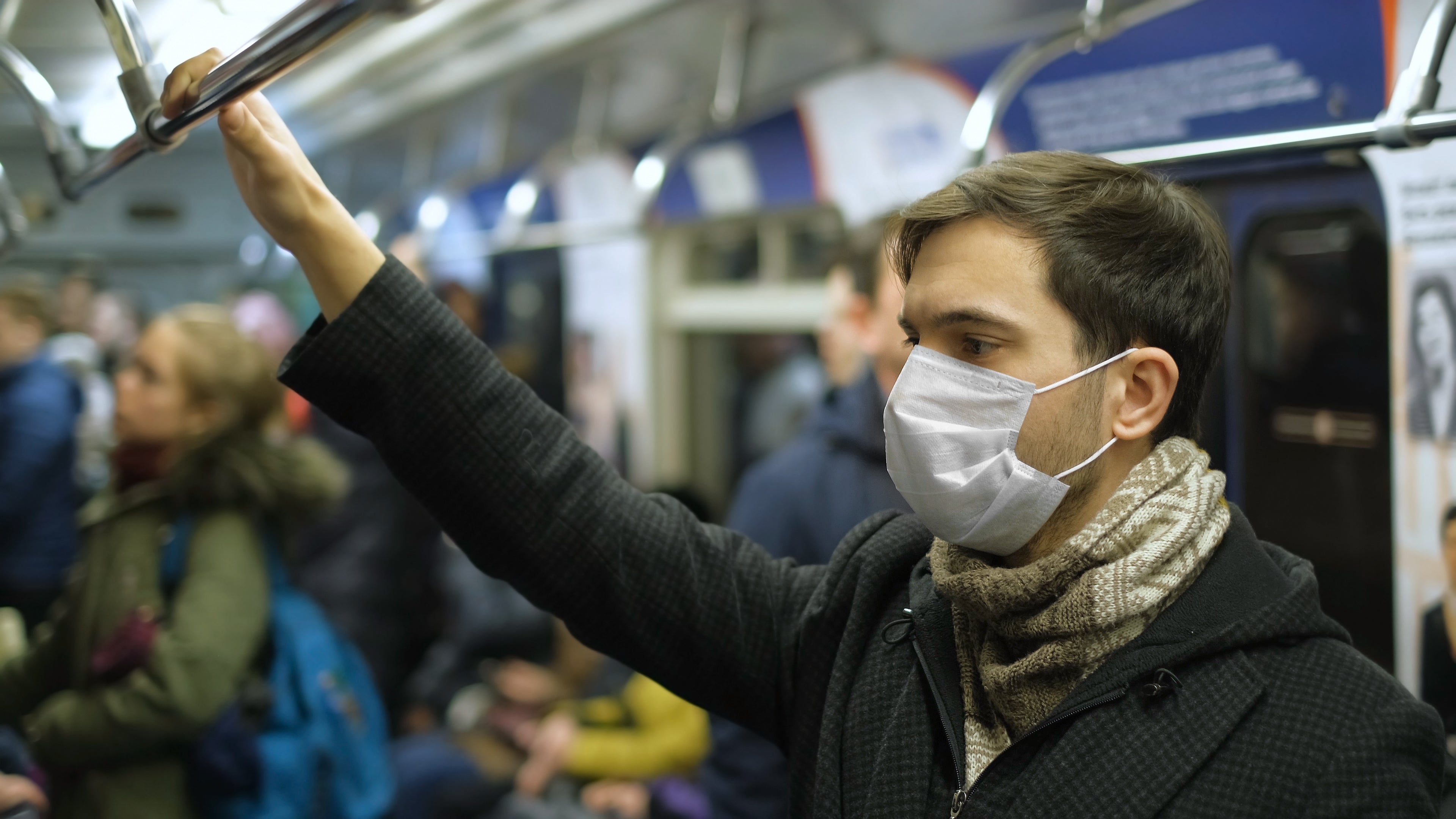‘Real men don’t wear masks’: The link between masculinity and face coverings
Figures suggest that men are more likely to refuse to wear face coverings than women. Olivia Petter investigates a gender imbalance in approaches to the pandemic


Andrew, 46, from London, has not worn a face covering once during the coronavirus pandemic. He doesn’t even own one. “The science around masks is conflicted,” he says, insisting that most masks are “ineffective” despite the fact that masks have been scientifically proven to reduce the spread of Covid-19 in numerous studies. “I agree that vulnerable people may want to take precautionary measures, but that is their choice,” he adds before citing incorrect facts and figures, which he stands by even when countered. What happens when people question Andrew’s bare face in restaurants or on public transport, where masks are compulsory? “I politely tell them I’m exempt.”
Face coverings are paramount to reducing the spread of coronavirus. They have been mandatory on public transport in England since 15 June, save for a few exemptions for health conditions, with a new law extending the rule to shops and other indoor spaces in July. The World Health Organisation has been urging people around the world to wear masks since June – by which point they had already been mandated in several countries – and a scientific review published in July in the Journal of the American Medical Association described face coverings as a “critical tool” in the fight against Covid-19.
The review, prompted Robert Redfield, director of the Centres for Disease Control and Prevention, to dub face coverings “one of the most powerful weapons we have to slow and stop the spread of the virus.” In light of all of this, there are an alarming number of people who, like Andrew, refuse to wear masks. What’s more, the evidence shows the majority of these people seem to be men.
In May, a survey of 2,459 people in the US conducted by two academics at Middlesex University, London, and the University of Berkeley, California, found that not only were men less likely to wear face masks in public than women, they were also more likely to agree that wearing one was “shameful, not cool and a sign of weakness” - a view that Fox Nation personality Tomi Lahren seemingly perpetuated when she said that US Democratic presidential nominee Joe Biden “might as well carry a purse with [his] mask”. A study conducted by the Kaiser Family Foundation, a US NGO focused on public health issues, also found that 68 per cent of women frequently wore a mask outside the home compared to 49 per cent of men. These figures have been well-documented, leading some to label face coverings the “condoms of the face”.
“This is a trend we’ve seen in previous epidemics, with men showing more reluctance to adopt safety precautions than women” says Emma Lygnerud Boberg, gender and programme development advisor, at the International Media Support, Denmark. It’s consistent with other data, she notes, that suggests men are less likely than women to wear seatbelts and visit their GP when they’re unwell. Previous studies have also shown that men are more likely to drive recklessly, either by speeding or by driving drunk.
Mask-wearing can be interpreted as showing weakness among some men
That men seem willing to take greater risk in day-to-day life, says Peter Glick, bias and discrimination expert at Lawrence University in Wisconsin, boils down to harmful gender stereotypes that condition men to glorify strength and fear vulnerability. “Men are socialised to be dominant and independent,” he tells The Independent. “These traits all serve to reinforce patriarchal norms that present masculinity as a performance. For these reasons, mask-wearing can be interpreted as showing weakness among some men. It suggests they fear the virus in a very public manner, which, in turn, punctures the bravado.” It’s no wonder researchers have blamed male gender norms for having a negative impact on men’s health.
Even after contracting Covid-19, and being hospitalised, President Donald Trump was keen to show he didn’t need a mask - removing it on the steps of the White House after returning from hospital. It was a moment that perfectly summed up the pandemic political theatre of 2020. Trump has used the idea that mask-wearing is a sign of weakness to further his political agenda. “I don’t wear masks like him,” the president said of Biden at a debate against him on 29 September. “Every time you see him, he’s got a mask. He could be speaking 200 feet away from them and he shows up with the biggest mask I’ve ever seen.” The implication seems to be that by not wearing a mask, Trump exudes greater strength than his opponent. The president furthered this idea again earlier this week when he teased House Majority Leader Nancy Pelosi by tweeting, “Wear your mask in the ‘beauty’ parlour, Nancy!”
There is a long history of venerating stereotypical masculinity norms on the political right, explains Glick. “Conservatives seem to be reacting to a broader sense of the erosion of male privilege and dominance in society, and they therefore look up to male leaders who embrace masculine stereotypes. The masculine leaders they elect are very protective of their macho image, making them anti-maskers,” he says. Glick’s theory is supported by research. In June, a study by the Pew Research Center in June found that 76 per cent of Democrat voters reported wearing a mask "all or most of the time in stores and other businesses" while 53 per cent of Republicans said the same.
Stereotypical gender norms are exacerbated when you pair them with Conservatism. “The reluctance to wear a mask is the result of internalised masculinity norms,” adds Boberg. “Politically speaking, libertarian-leaning people on the right hold freedom as a core value. Those on the left, however, are much more invested in the care foundation, ie protecting the vulnerable. This might explain why men on the right, politically speaking, perhaps see mask-wearing as an infringement on their masculinity to a higher degree than those men to the left.”

For the most part, those who refuse to wear masks do seem to attempt to justify their decision in science, albeit mostly misinformation, rather than just outright refuse to comply. “Coronavirus is a mild illness,” says Ewell, 26, from Sheffield, who believes that coronavirus poses no threat to him, so doesn’t require a mask. “There is little to no evidence that masks work,” says Joe*, 42, from Anglesea, in Wales, who ignores my requests for evidence. “Only 0.06 per cent of the population will die from Covid-19,” says Tom*, 44, from London, who also failed to provide the research he cited in our conversation.
People who do not wear face coverings where they are mandated can be fined £100 or more. The latest figures show that almost 400 fines have been issued to people refusing to wear masks on public transport in England thus far (the figures are not broken down by gender). But the risk of being penalised isn’t stopping people from not wearing masks. “I have to set an example [to others] that Covid is nothing to be feared for the majority of people,” says Tim, 18, in London. “I am less worried about the prospect about the monetary fine than I am by the very fact that the government has the power to police social decisions such as what we wear,” adds Ewell.
Are these men not concerned that by refusing to wear masks they are contributing to the rising death toll from Covid-19? “Has anyone considered that wearing masks may be contributing to the rising cases?” says Ewell. “We have more cases now than in March, before mask-wearing became compulsory, so how can it be that masks are an effective way of reducing infections?”
The reluctance to wear a mask is the result of internalised masculinity norms
The dangers of all this are clear to see. Not only are men more likely to be infected with coronavirus, but countless studies have shown they are also more likely to die after contracting the virus. In Europe, the World Health Organization reports that 70 per cent of all intensive care admissions related to Covid-19 were men, with men accounting for 57 per cent of all deaths. Meanwhile, research published in March by the British Medical Journal also found that the proportion of Covid-19 deaths were higher in men across China, Iran and South Korea. Additionally, data collated by Global Health 50/50 shows that, in the vast majority of other countries, men are consistently dying from coronavirus at a higher rate than women.
Unfortunately, it doesn’t look like anything is changing any time soon. Particularly not when you consider the fact that world leaders continue to downplay the virus. Since recovering from Covid-19, Trump has returned to hosting campaign rallies with mostly maskless crowds. Naturally, he, too, is maskless. And consider Brazilian president Jair Bolsonaro, who described coronavirus as “a little flu”. American comedian and podcast host Joe Rogan recently said that “only b****es wear face masks”. But perhaps the solution is easier than we think. At least, that’s what one recent article in the Los Angeles Times would have us believe. If we make face masks more “masculine”, it suggested, men might be more inclined to wear them.
*Names have been changed
Join our commenting forum
Join thought-provoking conversations, follow other Independent readers and see their replies
Comments
Bookmark popover
Removed from bookmarks